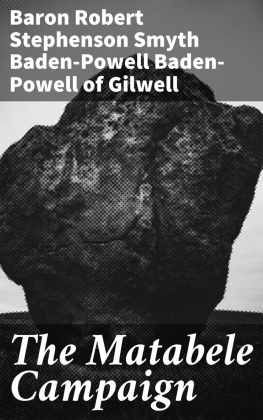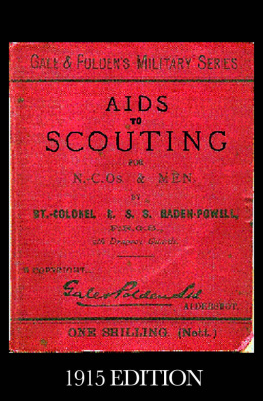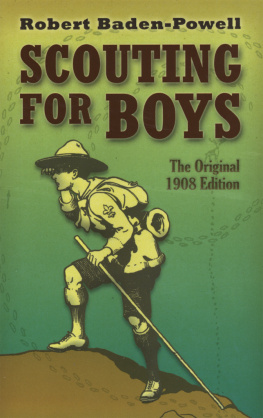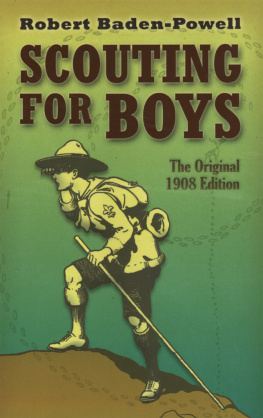BADEN-POWELL
OF MAFEKING
office
BADEN-POWELL IN HIS OFFICE
BADEN-POWELL
OF MAFEKING
BY
J.S. FLETCHER
AUTHOR OF "THE BUILDERS," "THE PATHS OF THE PRUDENT," ETC.
METHUEN & CO.
36 ESSEX STREET W.C.
LONDON
CONTENTS
|
| TO THE MAN IN THE STREET |
| BADEN-POWELLTHE MANNER OF MAN HE IS |
| Page |
| I. | 11 |
| II. | 18 |
| III. | 24 |
| IV. | 29 |
| V. | 42 |
| AN EXPEDITION AND A CAMPAIGN |
| I. | 47 |
| II. | 64 |
| THE STORY OF THE SIEGE OF MAFEKING, 1899-1900 |
| I. | 89 |
| II. | 97 |
| III. | 104 |
| IV. | 111 |
| V. | 119 |
LIST OF ILLUSTRATIONS
| PAGE |
| Frontispiece |
| (Sketch by the Author) | 14 |
| " " | 26 |
| " " | 29 |
| " " | 45 |
| " " | 48 |
| " " | 51 |
| " " | 55 |
| " " | 59 |
| " " | 63 |
| " " | 65 |
| " " | 66 |
| " " | 67 |
| " " | 70 |
| " " | 73 |
| " " | 75 |
| " " | 75 |
| " " | 79 |
| " " | 81 |
| " " | 87 |
| 95 |
| (Sketch by the Author) | 104 |
| " " | 104 |
| " " | 113 |
| 116 |
NOTE
THE AUTHOR DESIRES TO EXPRESS HIS OBLIGATIONS TO MISS BADEN-POWELL AND TO THE REV. CANON HAIG-BROWN FOR THEIR KINDNESS IN AFFORDING HIM HELP AND INFORMATION IN PREPARING THE FOLLOWING ACCOUNT OF MAJOR-GENERAL BADEN-POWELL'S CAREER.
INTRODUCTION
TO THE MAN IN THE STREET
It may well and fittingly be complained that of late years we English folk have shown an unpardonable spirit of curiosity about things which do not concern us. We have brought into being more than one periodical publication full of gossip about the private life and affairs of folk of eminence, and there are too many of us who are never so much pleased as when we are informed that a certain great artist abhors meat, or that a famous musician is inordinately fond of pickled salmon. There was a time when, to use a homely old phrase, people minded their own business and left that of their neighbours' alonethat day in some degree seems to have been left far behind, and most of us feel that we are being defrauded of our just rights if we may not step across the threshold of my lady's drawing-room or set foot in the statesman's cabinet. The fact is that we have itching ears nowadays, and cherish a passion for gossip which were creditable to the old women of the open doorways. We want to know allwhich is to say as much as chance will tell usabout the people of whom the street is talking, and the more we can hear of them, even of the things which appertain in reality to no one but themselves, the better we are pleased. But even here, in what is undoubtedly an evil, there is an element of possible good which under certain circumstances may be developed into magnificent results. Since we must talk amongst ourselves, since we must satisfy this very human craving for what is after all gossip, let us find great subjects to gossip about. If we must talk in the streets let us talk about great folk, about great deeds, about great examples, and since our subjects are great let us talk of them in a great way. There is no need to chatter idly and to no purposewe shall be all the better if our gossip about great men and great things leads us to even a faint imitation of both.
We English folk possess at this moment a magnificent opportunity of talking and thinking about the things and the men which make for good. It may be that ever since the Empire rose as one man to sustain the honour and glory of England we have glorified our fighting man a little too much. It may be that we have raised our voices too loudly in the music-halls and been too exuberant in our conduct in the streets. But after all, what does it mean? We are vulgar, we English, in our outward expression of joy and delightyes, but how splendidly our vulgarity is redeemed and even transformed into a fine thing by our immense feeling for race and country! What is it, after all, that we have been doing during this time of war but building up, renewing, strengthening that mysterious Something which for lack of a better word we call Empire? War, like sorrow, strengthens, chastens, and encourages. Just as the heart of a strong man is purified and made stronger by sorrow, so the spirit of a nation is lifted up and set on a higher pedestal by the trials and the awfulness of war. Heaven help the people which emerges from a great struggle broken, sullen, despondent!Heaven be thanked that from the blood of our fellows spilt in South Africa there have already sprung the flowers of new fortitude and new strength and new belief in our God-given destiny as the saviours of the world. It is as it ever was:
"We are a people yet!
Tho' all men else their nobler dreams forget,
Confused by brainless mobs and lawless Powers;
Thank Him who isled us here, and roughly set
His Britons in blown seas and storming showers,
We have a voice with which to pay the debt
Of boundless love and reverence and regret
To those great men who fought and kept it ours."
We have a voice!yes, and is it not well that at this juncture it should be raised in honour of the men who have mounted guard for us at the gates of Empire? It is well, too, that our ears should listen to stories of themsurely there is no taint of unpardonable curiosity in that, but rather an inquisitiveness which is worthy of praise. No man can hear of great men, nor think of brave deeds, without finding himself made better and richer. It is in the contemplation of greatness that even the most poorly-equipped amongst us may find a step to a higher place of thought.
Here then is an excuse for attempting to tell plain folk the story of Baden-Powell (no need to label him with titles or prefixes!) in a plain way. It is a task which has already been attempted and achieved by more than one person: the only reason why it should be attempted again is that a good story cannot be told too often, and that in its variations there may be something of value added to it by the particular narrator. It seems to me that this story of Baden-Powell finds its great charm in its revelation of character, and as being typical of the British officer at his best. I do not find Baden-Powell so much a prodigy as a type of the flower of a class which of late has been much maligned. We have been told, over and over again since we became involved in our struggle with the Boer, that our officers are badly trained, incompetent, and careless. It is not to be denied that there is room for improvement in their military education and training, but I think we shall have hard work to improve them in one matter of some slight importancetheir cheerful, brave, steady devotion to Duty. When one comes to think of it, seriously, what a great quality that is! To be ready to go anywhere, to do anything, or to attempt its doing with all the strength one possesses, to face whatever a moment may bring forth with the cheery pluck with which a schoolboy goes into a scrimmageare these not qualities which make for greatness? It seems to me that they are found in the British officer in an extraordinary degree, and that the life of Baden-Powell as we know it is typical of the results of the possession of them. I do not mean to say that every British officer is a Baden-Powell, but I cherish a strong conviction that Baden-Powell himself has said, more than once, when overwhelmed with congratulations, "Oh, any other fellow would have done the same!" Of course, that is all wrongwe all know that not every other fellow would. But I believe every other fellow would have Triedand to Try means a world of things. After all, the greatest thing in this world, and the surest passport to happiness in the next, is doing one's Duty, cheerfully, fearlessly, and confidently, and it is because there is so much evidence of the way in which the British officer attempts to do his, in the story of Baden-Powell's career, that I make no excuse for begging the man in the street to read it again, and again, and yet againwhoever writes, or tries to write it.








